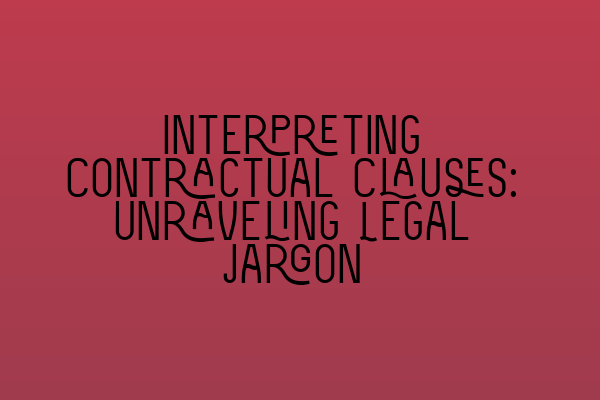Interpreting Contractual Clauses: Unraveling Legal Jargon
Contracts are an essential part of any business transaction. They provide the legal framework that governs the rights and obligations of the parties involved. However, contracts are often filled with complex and convoluted language that can be difficult to comprehend for the average person. In order to ensure that the intentions of the parties are properly understood and upheld, it is crucial to accurately interpret the contractual clauses. In this article, we will explore the process of interpreting contractual clauses and unravel the legal jargon.
The Principle of Contractual Interpretation
When it comes to interpreting contractual clauses, courts rely on a well-established principle known as the “objective interpretation.” This means that the courts will interpret a contract by objectively assessing the intentions of the parties at the time the contract was formed. The goal is to give effect to the reasonable expectations of the parties based on the language used in the contract.
It is important to note that the courts will prioritize the clear and unambiguous language of the contract over any extrinsic evidence. However, if the contract is unclear or susceptible to more than one interpretation, the courts may consider extrinsic evidence such as the parties’ conduct, negotiations, and industry customs in order to ascertain the true intentions of the parties.
Key Factors in Interpreting Contractual Clauses
When interpreting contractual clauses, there are several key factors that should be considered:
- Plain and Ordinary Meaning: The starting point for interpreting a contractual clause is to give effect to its plain and ordinary meaning. This involves understanding the words and phrases used in the contract in their normal and everyday sense.
- Context: The context in which a contractual clause appears is crucial for interpretation. It is important to consider the contract as a whole, including its structure, purpose, and the relationship between the clauses.
- Commercial Sense: Contracts are often entered into for commercial purposes, and it is therefore necessary to interpret contractual clauses in a manner that gives effect to the commercial sense of the agreement. This involves considering the business objectives and commercial realities underlying the contract.
- Custom and Usage: In certain industries or trades, there may be established customs or usages that are well-known to the parties. These customs or usages can be considered in interpreting contractual clauses, particularly if they are widely accepted and understood.
- Legislative Framework: Contractual interpretation is also influenced by the applicable legislative framework. It is important to consider relevant statutes and common law principles that may impact the interpretation of the contract.
The Role of Legal Professionals
Given the complexity of contractual language and the importance of accurately interpreting contractual clauses, it is advisable to seek the assistance of legal professionals. Solicitors who specialize in contract law can provide valuable insights and guidance in understanding the intricacies of contractual clauses.
Legal professionals can help clarify the language used in the contract, identify any potential ambiguities, and provide an objective analysis of the parties’ intentions. They can also assist in assessing the potential legal consequences of different interpretations and advise on the best course of action.
Furthermore, legal professionals can provide expert assistance in negotiating and drafting contracts to ensure that the contractual clauses are clear, unambiguous, and reflect the intentions of the parties. This can help prevent future disputes and minimize the risk of litigation.
Conclusion
Interpreting contractual clauses is a complex task that requires careful analysis and consideration. By applying the principle of objective interpretation, considering key factors such as plain and ordinary meaning, context, commercial sense, custom and usage, and the legislative framework, parties can ensure that their contracts are interpreted in a manner that reflects their true intentions.
Although legal professionals play a crucial role in interpreting contractual clauses, it is important for all parties involved in contract negotiations to have a basic understanding of contract law principles. This can help facilitate effective communication and ensure that the contract accurately captures the rights and obligations of the parties.
For more insights into contract law, please check out our related articles:
- Exploring the Impact of Frustration on Contractual Obligations: Legal Insights
- Interpreting Contractual Clauses: Unlocking the Hidden Meanings
- Legal Aspects of Business Contracts: Key Considerations for Entrepreneurs
- Agreements in Contract Law: Understanding Its Various Types
- Essentials of Consideration: Understanding the Basis of Contractual Exchange
